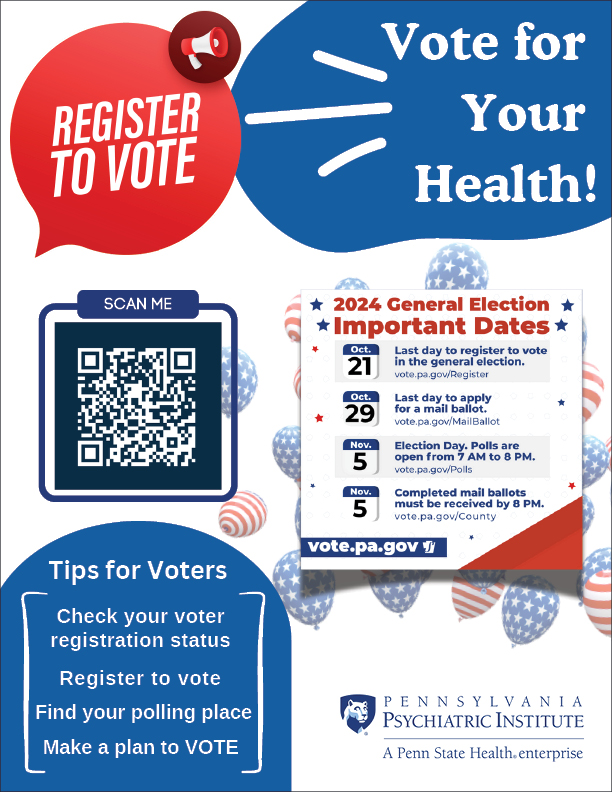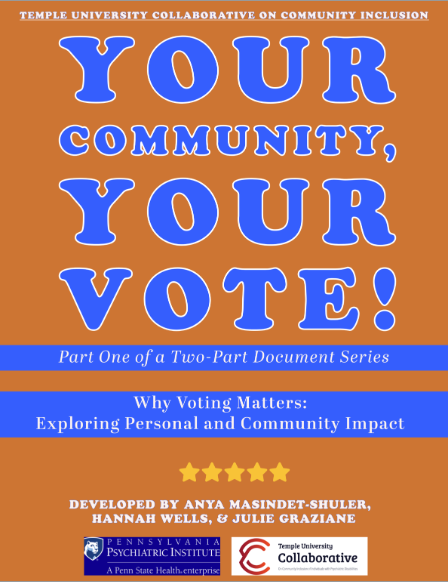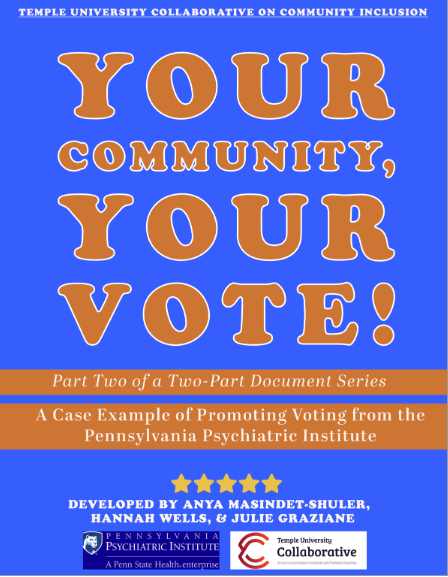In central Pennsylvania, voting is a powerful way to support the community and contribute to important decisions that affect everyone’s well-being. Julie Graziane, MD, associate professor, Department of Psychiatry and Behavioral Health at Penn State College of Medicine, is leading an initiative at the Pennsylvania Psychiatric Institute (PPI), a Penn State Health enterprise, to help individuals, especially those with mental health challenges, understand the impact of their vote.
“The act of voting allows us to have our voices heard and the issues we care about brought to the table,” highlights Graziane, MD.

Why Voting is Important
By voting, individuals can ensure their opinion is considered when leaders make decisions that affect their daily lives, helping to shape policies that provide better support, access to care and overall well-being for themselves and their communities. For nearly one in five adults in the U.S. who have experienced a mental health condition, voting is an opportunity for them to be heard and to highlight the issues that are important to them. “When people vote, it reinforces the idea that their voice matters, that they matter,” Graziane adds.
Beyond the importance of having one’s voice heard, voting impacts mental health. Civic engagement, including voting, is associated with decreased depressive symptoms and risky health-related behaviors. Focus group data indicates that political participation is an important element of psychiatric recovery. Election outcomes affect access to housing, health care, transportation, neighborhood safety and other public resources*. This suggests that voting is beneficial for mental health and impacts key social determinants of health, which in turn affect mental well-being.
Mental Health and Voting
Individuals who have experienced mental health challenges often face obstacles like a lack of awareness about their voting rights or difficulty navigating the registration process. These barriers can make it harder for them to participate in elections. However, when they do engage in voting, it can have a profoundly positive impact by empowering them to influence policies that directly affect their care and overall well-being. “Voting is a way for people with mental health conditions to have their voices heard on issues that directly impact their care,” says Graziane.
Barriers to Voting
“A major barrier is that many people are not fully informed about their voting rights or how to navigate the registration process,” Graziane notes.
At PPI, a dedicated, nonpartisan team works to remove barriers that individuals experiencing mental health challenges often face in the voting process. The team helps individuals understand their voting rights, assists with registration using digital tools and guides them on where and when they can vote legally. They provide crucial education on the importance of voting, helping individuals make connections between the act of voting and the policies and laws that govern everyday issues, like access to care, housing and recovery-oriented services. This support ensures that people are informed, registered and ready to participate in elections.
The Pennsylvania Department of State offers essential guidance on PA.gov for those getting ready to vote in the upcoming election:
- Eligibility: You must be at least 18 years old on Election Day and a U.S. citizen having lived in the Pennsylvania election district for your residential address for at least 30 days before the election
- Registration Methods: You can register to vote online, by mail, or in person at locations like the Department of Motor Vehicles
- Deadlines: You must be registered at least 15 days before the election
- Checking Registration: You should verify your voter registration status online to ensure it is accurate and current
Pennsylvanians who need voting information or encounter voting problems can call the State’s year-round voter hotline, 1-877-868-3772.
Managing Election Stress
Elections can be stressful, especially for those with preexisting mental health conditions. Graziane advises, “Like with any stressful situation, it’s important to be aware of your boundaries and recognize what might trigger additional stress.” She encourages using coping strategies like mindfulness and deep breathing to manage election-related anxiety.
“The options of voting by mail or using tools to prepare before entering the voting booth can also reduce stress, allowing people to vote on their terms,” she adds. These options, along with others based on recovery-orientated principles, are part of the advice the PPI team offers.
Encouraging Others to Vote
Graziane encourages all health care providers to discuss voting with their patients. “Voting is a vital part of our democracy, and it’s disheartening to see segments of the population face barriers to participating,” she says. She stresses the importance of approaching the topic in a neutral, nonpartisan way, ensuring patients feel empowered without added pressure.
Voting is not just about choosing candidates; it’s a way for individuals to engage with their community and influence the policies that affect their lives. With the support of programs like the one at PPI, more people are finding their voice through voting.
Your Community, Your Vote
This two-part non-partisan document series focuses on why voting is important and how practitioners can support individuals experiencing mental health challenges to vote.



